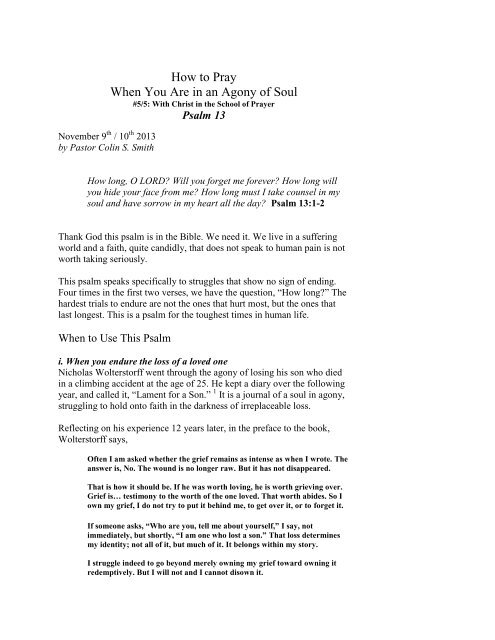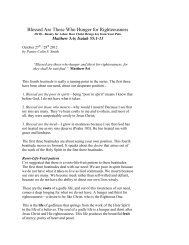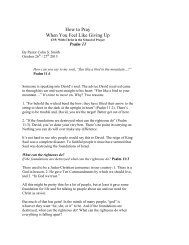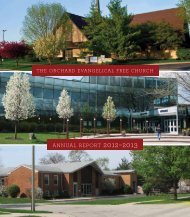How to Pray When You Are in an Agony of Soul
How to Pray When You Are in an Agony of Soul - The Orchard
How to Pray When You Are in an Agony of Soul - The Orchard
- No tags were found...
Create successful ePaper yourself
Turn your PDF publications into a flip-book with our unique Google optimized e-Paper software.
November 9 th / 10 th 2013<br />
by Pas<strong>to</strong>r Col<strong>in</strong> S. Smith<br />
<strong>How</strong> <strong>to</strong> <strong>Pray</strong><br />
<strong>When</strong> <strong>You</strong> <strong>Are</strong> <strong>in</strong> <strong>an</strong> <strong>Agony</strong> <strong>of</strong> <strong>Soul</strong><br />
#5/5: With Christ <strong>in</strong> the School <strong>of</strong> <strong>Pray</strong>er<br />
Psalm 13<br />
<strong>How</strong> long, O LORD? Will you forget me forever? <strong>How</strong> long will<br />
you hide your face from me? <strong>How</strong> long must I take counsel <strong>in</strong> my<br />
soul <strong>an</strong>d have sorrow <strong>in</strong> my heart all the day? Psalm 13:1-2<br />
Th<strong>an</strong>k God this psalm is <strong>in</strong> the Bible. We need it. We live <strong>in</strong> a suffer<strong>in</strong>g<br />
world <strong>an</strong>d a faith, quite c<strong>an</strong>didly, that does not speak <strong>to</strong> hum<strong>an</strong> pa<strong>in</strong> is not<br />
worth tak<strong>in</strong>g seriously.<br />
This psalm speaks specifically <strong>to</strong> struggles that show no sign <strong>of</strong> end<strong>in</strong>g.<br />
Four times <strong>in</strong> the first two verses, we have the question, “<strong>How</strong> long?” The<br />
hardest trials <strong>to</strong> endure are not the ones that hurt most, but the ones that<br />
last longest. This is a psalm for the <strong>to</strong>ughest times <strong>in</strong> hum<strong>an</strong> life.<br />
<strong>When</strong> <strong>to</strong> Use This Psalm<br />
i. <strong>When</strong> you endure the loss <strong>of</strong> a loved one<br />
Nicholas Wolters<strong>to</strong>rff went through the agony <strong>of</strong> los<strong>in</strong>g his son who died<br />
<strong>in</strong> a climb<strong>in</strong>g accident at the age <strong>of</strong> 25. He kept a diary over the follow<strong>in</strong>g<br />
year, <strong>an</strong>d called it, “Lament for a Son.” 1 It is a journal <strong>of</strong> a soul <strong>in</strong> agony,<br />
struggl<strong>in</strong>g <strong>to</strong> hold on<strong>to</strong> faith <strong>in</strong> the darkness <strong>of</strong> irreplaceable loss.<br />
Reflect<strong>in</strong>g on his experience 12 years later, <strong>in</strong> the preface <strong>to</strong> the book,<br />
Wolters<strong>to</strong>rff says,<br />
Often I am asked whether the grief rema<strong>in</strong>s as <strong>in</strong>tense as when I wrote. The<br />
<strong>an</strong>swer is, No. The wound is no longer raw. But it has not disappeared.<br />
That is how it should be. If he was worth lov<strong>in</strong>g, he is worth griev<strong>in</strong>g over.<br />
Grief is… testimony <strong>to</strong> the worth <strong>of</strong> the one loved. That worth abides. So I<br />
own my grief, I do not try <strong>to</strong> put it beh<strong>in</strong>d me, <strong>to</strong> get over it, or <strong>to</strong> forget it.<br />
If someone asks, “Who are you, tell me about yourself,” I say, not<br />
immediately, but shortly, “I am one who lost a son.” That loss determ<strong>in</strong>es<br />
my identity; not all <strong>of</strong> it, but much <strong>of</strong> it. It belongs with<strong>in</strong> my s<strong>to</strong>ry.<br />
I struggle <strong>in</strong>deed <strong>to</strong> go beyond merely own<strong>in</strong>g my grief <strong>to</strong>ward own<strong>in</strong>g it<br />
redemptively. But I will not <strong>an</strong>d I c<strong>an</strong>not disown it.
2<br />
Psalm 13 is a lament, so when you walk through irreplaceable loss, this<br />
psalm is for you.<br />
ii. <strong>When</strong> you experience stra<strong>in</strong> <strong>in</strong> the family<br />
James Boice comments on this:<br />
It may be that the happ<strong>in</strong>ess <strong>of</strong> the early days <strong>of</strong> a marriage has been<br />
replaced by the stress <strong>of</strong> try<strong>in</strong>g <strong>to</strong> work out… difficulties. <strong>You</strong> may be<br />
wonder<strong>in</strong>g if God has ceased <strong>to</strong> bless your marriage.<br />
<strong>You</strong>r problems may <strong>in</strong>volve children. <strong>You</strong> remember the early days when it<br />
was comparatively easy <strong>to</strong> rear them. <strong>You</strong>r family had m<strong>an</strong>y good times<br />
<strong>to</strong>gether. But now one or more <strong>of</strong> your children is <strong>an</strong>tagonistic <strong>an</strong>d<br />
rebellious, <strong>an</strong>d everyone else <strong>in</strong> the family suffers under the <strong>in</strong>evitable<br />
stra<strong>in</strong>. Nobody has fun <strong>an</strong>ymore.<br />
<strong>When</strong> the joy has gone out <strong>of</strong> life, when you feel that you are endur<strong>in</strong>g<br />
rather th<strong>an</strong> enjoy<strong>in</strong>g, this psalm is for you.<br />
iii. <strong>When</strong> you experience long term exhaustion<br />
<strong>You</strong> have been carry<strong>in</strong>g a heavy burden for a long period <strong>of</strong> time, <strong>an</strong>d the<br />
stra<strong>in</strong> is beg<strong>in</strong>n<strong>in</strong>g <strong>to</strong> tell. It may be physical pa<strong>in</strong> or mental <strong>an</strong>guish, or it<br />
may be the sheer weight <strong>of</strong> responsibility that God has placed on your<br />
shoulders, <strong>an</strong>d you’ve been carry<strong>in</strong>g it for a long period <strong>of</strong> time.<br />
God has susta<strong>in</strong>ed you, but as time goes by, the burden seems <strong>to</strong> get<br />
heavier. <strong>You</strong> f<strong>in</strong>d yourself say<strong>in</strong>g “<strong>How</strong> long, O Lord? I’m not sure I have<br />
the ability <strong>to</strong> susta<strong>in</strong> it much longer.” If you’re not <strong>in</strong> one <strong>of</strong> these<br />
situations <strong>to</strong>day, th<strong>an</strong>k God, <strong>an</strong>d remember that m<strong>an</strong>y <strong>of</strong> your brothers <strong>an</strong>d<br />
sisters <strong>in</strong> Christ are.<br />
If you’ve been shaped by a form <strong>of</strong> Christi<strong>an</strong>ity that only speaks about<br />
prayers that are <strong>an</strong>swered <strong>an</strong>d faith that receives <strong>an</strong>d bless<strong>in</strong>gs that<br />
abound, you need <strong>to</strong> take this psalm, <strong>an</strong>d others like it, seriously.<br />
We live <strong>in</strong> a suffer<strong>in</strong>g world, <strong>an</strong>d Christi<strong>an</strong> believers are not exempt from<br />
suffer<strong>in</strong>g. No one who takes the Bible seriously c<strong>an</strong> come <strong>to</strong> the<br />
conclusion that Jesus promised his followers a pa<strong>in</strong>-free life. We are<br />
followers <strong>of</strong> the one who was crucified.<br />
God speaks <strong>to</strong> this suffer<strong>in</strong>g world, <strong>to</strong> life as it is. Rom<strong>an</strong>s 8 is one <strong>of</strong> the<br />
greatest chapters <strong>of</strong> the Bible. <strong>How</strong> does it beg<strong>in</strong>? “There is no<br />
condemnation for those who are <strong>in</strong> Christ Jesus.” <strong>How</strong> does it end?<br />
“Noth<strong>in</strong>g c<strong>an</strong> separate us from the love <strong>of</strong> Christ.”
3<br />
What do you f<strong>in</strong>d <strong>in</strong> the middle? Paul says, “We ourselves, who have the<br />
firstfruits <strong>of</strong> the Spirit, gro<strong>an</strong> <strong>in</strong>wardly as we wait eagerly for adoption as<br />
sons, the redemption <strong>of</strong> our bodies” (Rom<strong>an</strong>s 8:23).<br />
This is a “gro<strong>an</strong><strong>in</strong>g psalm” <strong>an</strong>d God has placed it <strong>in</strong> the Bible because at<br />
some time all <strong>of</strong> us will need it. <strong>How</strong> are you <strong>to</strong> pray when you are <strong>in</strong> <strong>an</strong><br />
agony <strong>of</strong> soul? Here are four <strong>an</strong>swers from this psalm:<br />
1. Lay Out What <strong>You</strong> Feel<br />
<strong>How</strong> long, O LORD? Will you forget me forever? <strong>How</strong> long will you hide<br />
your face from me? <strong>How</strong> long must I take counsel <strong>in</strong> my soul <strong>an</strong>d have<br />
sorrow <strong>in</strong> my heart all the day? <strong>How</strong> long shall my enemy be exalted over<br />
me? Psalm 13:1-2<br />
The most strik<strong>in</strong>g th<strong>in</strong>g about the beg<strong>in</strong>n<strong>in</strong>g <strong>of</strong> this psalm is the complete<br />
c<strong>an</strong>dor with which David lays out his struggle before God. No holds<br />
barred! David feels that he has reached his limit, <strong>an</strong>d he says how it is <strong>in</strong><br />
the presence <strong>of</strong> God. He is seek<strong>in</strong>g <strong>an</strong> authentic relationship, <strong>an</strong>d that c<strong>an</strong><br />
only happen with honesty.<br />
i. The struggle with his enemy<br />
<strong>How</strong> long shall my enemy be exalted over me? Psalm 13:2<br />
What David is fac<strong>in</strong>g has ga<strong>in</strong>ed the upper h<strong>an</strong>d. It is “over” him. He feels<br />
pressed down by it. He is not prevail<strong>in</strong>g over it.<br />
If you <strong>of</strong>fered a sem<strong>in</strong>ar <strong>to</strong> David on “<strong>How</strong> <strong>to</strong> Live the Vic<strong>to</strong>rious<br />
Christi<strong>an</strong> Life,” he would say, “I’m not com<strong>in</strong>g. That’s not for me. I feel<br />
defeated. I barely know how <strong>to</strong> keep go<strong>in</strong>g, let alone be vic<strong>to</strong>rious.”<br />
ii. The struggle with himself<br />
<strong>How</strong> long must I take counsel <strong>in</strong> my soul <strong>an</strong>d have sorrow <strong>in</strong> my heart all<br />
the day? Psalm 13:2<br />
David’s thoughts are go<strong>in</strong>g round <strong>in</strong> circles: “What am I go<strong>in</strong>g <strong>to</strong> do? <strong>How</strong><br />
am I go<strong>in</strong>g <strong>to</strong> survive?” But there never is <strong>an</strong> <strong>an</strong>swer. The pa<strong>in</strong> never goes<br />
away. All this never moves you forward.<br />
iii. The struggle with God<br />
<strong>How</strong> long, O LORD? Will you forget me forever? <strong>How</strong> long will you hide<br />
your face from me? Psalm 13:1<br />
David beg<strong>in</strong>s with this because it goes <strong>to</strong> the heart <strong>of</strong> the problem, “Why<br />
does God seem so far away at precisely the po<strong>in</strong>t where I feel my need <strong>of</strong><br />
him most?” David lays out how he feels here. The fact that these words
4<br />
are given <strong>to</strong> us <strong>in</strong> Scripture should teach us that a godly believer c<strong>an</strong> come<br />
<strong>to</strong> a place <strong>of</strong> feel<strong>in</strong>g ab<strong>an</strong>doned by God.<br />
From his m<strong>an</strong>y years <strong>of</strong> experience as a pas<strong>to</strong>r, James Boice says:<br />
I am conv<strong>in</strong>ced that a feel<strong>in</strong>g <strong>of</strong> ab<strong>an</strong>donment [among Christi<strong>an</strong>s] is far<br />
more common th<strong>an</strong> it appears <strong>to</strong> be. M<strong>an</strong>y people feel ab<strong>an</strong>doned – by<br />
others, first, but ultimately also by God.<br />
He goes on <strong>to</strong> say that although this is a common problem, it seems <strong>to</strong> be<br />
one that is <strong>of</strong>ten ignored:<br />
Why do you suppose this is? I th<strong>in</strong>k it is because we have been taught that<br />
Christi<strong>an</strong>s are not supposed <strong>to</strong> experience such th<strong>in</strong>gs, that we are only <strong>to</strong><br />
have the “life more abund<strong>an</strong>tly” or <strong>to</strong> “live vic<strong>to</strong>riously.”<br />
David speaks about his experience openly, <strong>an</strong>d the Holy Spirit has placed<br />
his experience <strong>of</strong> feel<strong>in</strong>g utterly ab<strong>an</strong>doned by God <strong>in</strong> the Scriptures for<br />
us. Speak<strong>in</strong>g openly about your experience won’t solve the problem, but<br />
it’s critical <strong>to</strong> hav<strong>in</strong>g <strong>an</strong> authentic relationship with Almighty God.<br />
2. Lift Up What <strong>You</strong> Need<br />
Answer me, O LORD my God; light up my eyes… Psalm 13:3<br />
<strong>How</strong> would you try <strong>to</strong> help a person <strong>in</strong> your Life group who basically felt<br />
that they were ab<strong>an</strong>doned by God? Suppose someone were <strong>to</strong> say <strong>to</strong> you,<br />
“I’ve been a believer for m<strong>an</strong>y years, but right now I feel that God has<br />
forgotten me. I’ve been pray<strong>in</strong>g, but I don’t get <strong>an</strong>y <strong>an</strong>swers. I wonder if<br />
God really cares about me at all.”<br />
HOW TO HELP A PERSON WHO FEELS ABANDONED BY GOD<br />
i. Recognize the experience<br />
If a mature believer like David (who was a m<strong>an</strong> after God’s own heart)<br />
c<strong>an</strong> feel ab<strong>an</strong>doned by God, no one should be surprised when a brother or<br />
sister experiences someth<strong>in</strong>g like this.<br />
Don’t assume the worst about a believer who feels that God has<br />
ab<strong>an</strong>doned him or her. Remember, the dark valley is a part <strong>of</strong> the walk <strong>of</strong><br />
the Christi<strong>an</strong> faith.<br />
HOW TO HELP A PERSON WHO FEELS ABANDONED BY GOD<br />
ii. Discern the question<br />
It is a mistake <strong>to</strong> assume that everyone who suffers is ask<strong>in</strong>g the question<br />
“Why?” Some people are ask<strong>in</strong>g “Why?” when they suffer, but others are<br />
ask<strong>in</strong>g “<strong>How</strong> long?” These are different questions. “Why?” is a question<br />
<strong>of</strong> me<strong>an</strong><strong>in</strong>g; “<strong>How</strong> long?” is a question <strong>of</strong> endur<strong>an</strong>ce.
5<br />
There are m<strong>an</strong>y psalms that ask the question, “Why?” For example, “My<br />
God, my God, why have you forsaken me?” (Psalm 22:1). But the<br />
question here is not “Why?” It is “<strong>How</strong> long?”<br />
The question David is ask<strong>in</strong>g is not, “<strong>How</strong> do I make sense <strong>of</strong> my<br />
suffer<strong>in</strong>g?” but “<strong>How</strong> much longer c<strong>an</strong> I endure it?” It’s not a cry for<br />
wisdom, it’s a cry for strength.<br />
It wouldn’t have helped David for us <strong>to</strong> quote Rom<strong>an</strong>s 8:28 <strong>to</strong> him: “God<br />
works <strong>in</strong> all th<strong>in</strong>gs for the good <strong>of</strong> those who love him.” David would say,<br />
“That’s good, but how am I go<strong>in</strong>g <strong>to</strong> get through the rest <strong>of</strong> the week?”<br />
HOW TO HELP A PERSON WHO FEELS ABANDONED BY GOD<br />
iii. Ask for help<br />
The best th<strong>in</strong>g that you c<strong>an</strong> do <strong>to</strong> help a believer who feels overwhelmed<br />
by their sorrow, <strong>an</strong>d ab<strong>an</strong>doned by God is <strong>to</strong> come alongside them; <strong>to</strong> pray<br />
for them <strong>an</strong>d <strong>to</strong> pray with them, especially if they do not feel able <strong>to</strong> pray<br />
for themselves.<br />
Notice how <strong>an</strong>d what David prays here: “Consider <strong>an</strong>d <strong>an</strong>swer me, O<br />
LORD my God; light up my eyes…” (Psalm 13:3). “Light up my eyes…”<br />
That’s a prayer for strength.<br />
<strong>When</strong> a person is <strong>in</strong> <strong>an</strong> agony <strong>of</strong> soul, as David was, they’re not look<strong>in</strong>g<br />
for <strong>an</strong> <strong>an</strong>swer, <strong>an</strong>d it won’t help much if you try <strong>to</strong> give one. What they’re<br />
look<strong>in</strong>g for is strength—a sense <strong>of</strong> the help <strong>an</strong>d the presence <strong>of</strong> God—<br />
that’s why the best way you c<strong>an</strong> help is <strong>to</strong> come alongside <strong>in</strong> genu<strong>in</strong>e<br />
sympathy <strong>an</strong>d help them draw near <strong>to</strong> the everlast<strong>in</strong>g God <strong>in</strong> prayer.<br />
Follow David’s example. He asks God <strong>to</strong> “light up his eyes.” Lord, help<br />
me <strong>to</strong> see you. Help me <strong>to</strong> f<strong>in</strong>d strength. Help me <strong>to</strong> press on.<br />
3. Le<strong>an</strong> In<strong>to</strong> What <strong>You</strong> Know<br />
But I have trusted <strong>in</strong> your steadfast love; Psalm 13:5<br />
This is the great Bible word hesed, beautifully tr<strong>an</strong>slated “steadfast love.”<br />
This is love that lasts, love that you c<strong>an</strong> count on. God’s love for you had<br />
no beg<strong>in</strong>n<strong>in</strong>g <strong>an</strong>d it will have no end. In the eternity <strong>of</strong> the nature <strong>of</strong> the<br />
triune God, he has loved you with <strong>an</strong> everlast<strong>in</strong>g love.<br />
The issue that David is fac<strong>in</strong>g shows no sign <strong>of</strong> go<strong>in</strong>g away. It has been<br />
go<strong>in</strong>g on for a long time, <strong>an</strong>d the question is “<strong>How</strong> long?” David dares <strong>to</strong><br />
believe that God’s love for him will go longer th<strong>an</strong> his suffer<strong>in</strong>g, that<br />
God’s love will outlast the pa<strong>in</strong> that he endures!
6<br />
David confronts the pa<strong>in</strong> <strong>of</strong> his long-last<strong>in</strong>g sorrow with the reality <strong>of</strong> a<br />
longer last<strong>in</strong>g love. In the middle <strong>of</strong> all this he says, “I have trusted <strong>in</strong> your<br />
steadfast love.”<br />
There are times <strong>in</strong> the Christi<strong>an</strong> life when the love <strong>of</strong> God is known by<br />
faith <strong>an</strong>d by feel<strong>in</strong>g. There will also be times <strong>in</strong> your life when God’s love<br />
is known by faith alone. There is a gritt<strong>in</strong>g <strong>of</strong> David’s teeth <strong>in</strong> what he<br />
says here. It is a marvelously courageous statement <strong>of</strong> faith: “I have<br />
trusted <strong>in</strong> your steadfast love, however long this trial cont<strong>in</strong>ues.”<br />
Then David says someth<strong>in</strong>g else: “I will s<strong>in</strong>g <strong>to</strong> the LORD, because he has<br />
dealt bountifully with me” (Psalm 13:6). The s<strong>in</strong>g<strong>in</strong>g is future. But when<br />
David says that God has dealt bountifully with him, he is le<strong>an</strong><strong>in</strong>g <strong>in</strong><strong>to</strong> what<br />
he has already experienced.<br />
<strong>How</strong> c<strong>an</strong> David say this? Th<strong>in</strong>k about the bigger picture <strong>of</strong> David’s life.<br />
He was a shepherd, <strong>an</strong>d yet by God’s grace he has become a k<strong>in</strong>g. He was<br />
a s<strong>in</strong>ner, <strong>an</strong>d yet by God’s grace he had been forgiven. He was a sufferer,<br />
<strong>an</strong>d yet by God’s grace, he has a future <strong>of</strong> unclouded joy.<br />
David le<strong>an</strong>s <strong>in</strong><strong>to</strong> this, <strong>an</strong>d he says “Not only have I trusted <strong>in</strong> your<br />
steadfast love, but you have dealt bountifully with me.” Th<strong>in</strong>k about the<br />
bigger picture <strong>of</strong> your life.<br />
4. Look At Jesus Christ<br />
We called this series, “With Christ In the School <strong>of</strong> <strong>Pray</strong>er.” The m<strong>in</strong>d <strong>of</strong><br />
Christ was saturated with these psalms. He would have recited them <strong>in</strong> the<br />
synagogue. He used them. He experienced them. And he is with us when<br />
we pray them.<br />
What does Jesus know about this psalm? <strong>How</strong> does it relate <strong>to</strong> him?<br />
i. Did Jesus ever know what it is <strong>to</strong> be <strong>in</strong> <strong>an</strong> agony <strong>of</strong> soul?<br />
Yes! “In the days <strong>of</strong> his flesh, Jesus <strong>of</strong>fered up prayers <strong>an</strong>d supplications,<br />
with loud cries <strong>an</strong>d tears…” (Hebrews 5:7).<br />
ii. Did Jesus ever know what it was like <strong>to</strong> say “<strong>How</strong> long?”<br />
Yes. He was “the m<strong>an</strong> <strong>of</strong> sorrows <strong>an</strong>d familiar with suffer<strong>in</strong>g.” In the<br />
Garden <strong>of</strong> Gethsem<strong>an</strong>e he said, “My soul is very sorrowful even <strong>to</strong> death”<br />
(Matthew 26:38).<br />
iii. Did Jesus ever know what it was like for the Father <strong>to</strong> hide his face?<br />
Yes! He cried out from the cross with a loud voice, “My God, my God,<br />
why have you forsaken me?” (Matthew 27:46).
7<br />
Christ knows what it is <strong>to</strong> be <strong>in</strong> <strong>an</strong> agony <strong>of</strong> soul. That’s why he is there<br />
for you when you suffer. Christ is the Savior for those who suffer<br />
because he is the suffer<strong>in</strong>g Savior.<br />
John S<strong>to</strong>tt says this so well <strong>in</strong> a mov<strong>in</strong>g passage from his book “The Cross<br />
<strong>of</strong> Christ,” 2<br />
I could never myself believe <strong>in</strong> God, if it were not for the cross… In the real<br />
world <strong>of</strong> pa<strong>in</strong>, how could one worship a God who was immune <strong>to</strong> it?<br />
I have entered m<strong>an</strong>y Buddhist temples… <strong>an</strong>d s<strong>to</strong>od respectfully before the<br />
statue <strong>of</strong> the Buddha, his legs crossed, arms folded, eyes closed, the ghost <strong>of</strong><br />
a smile play<strong>in</strong>g round his mouth, a remote look on his face, detached from<br />
the agonies <strong>of</strong> the world. But each time after a while I have <strong>to</strong> turn away.<br />
In my imag<strong>in</strong>ation I have turned <strong>in</strong>stead <strong>to</strong> that lonely, twisted, <strong>to</strong>rtured<br />
figure on the cross, nails through h<strong>an</strong>ds <strong>an</strong>d feet, back lacerated, limbs<br />
wrenched, brow bleed<strong>in</strong>g from thorn pricks, mouth dry <strong>an</strong>d <strong>in</strong><strong>to</strong>lerably<br />
thirsty, plunged <strong>in</strong> God-forsaken darkness. That is the God for me!<br />
That is the only God for a suffer<strong>in</strong>g world, the only God for you, the only<br />
God for me.<br />
As we approach Veter<strong>an</strong>’s Day, I w<strong>an</strong>t you <strong>to</strong> know about Edward<br />
Shilli<strong>to</strong>, who experienced the horrors <strong>of</strong> The First War.<br />
M<strong>an</strong>y people who endured this felt that they could no longer believe <strong>in</strong><br />
God. But Shilli<strong>to</strong> went a different way. The horrors <strong>of</strong> war conv<strong>in</strong>ced him<br />
that a suffer<strong>in</strong>g world needs a suffer<strong>in</strong>g Savior. He wrote a poem called,<br />
“Jesus <strong>of</strong> the Scars.” In these l<strong>in</strong>es he is speak<strong>in</strong>g <strong>of</strong> the world <strong>of</strong> religion<br />
with all its varieties…<br />
The other gods were strong; but you were weak;<br />
They rode, but you stumbled <strong>to</strong> a throne;<br />
But <strong>to</strong> our wounds only c<strong>an</strong> God’s wounds speak,<br />
And not a god has wounds, but you alone.<br />
The wounds <strong>of</strong> Christ are his credentials <strong>to</strong> a suffer<strong>in</strong>g world. And by<br />
God’s grace, he came through it, <strong>an</strong>d by God’s help you will <strong>to</strong>o.<br />
1 Nicholas Wolters<strong>to</strong>rff, “Lament for a Son,” Eerdm<strong>an</strong>’s, 1987<br />
2 John S<strong>to</strong>tt, “The Cross <strong>of</strong> Christ,” p. 326, InterVarsity Press, 2006





